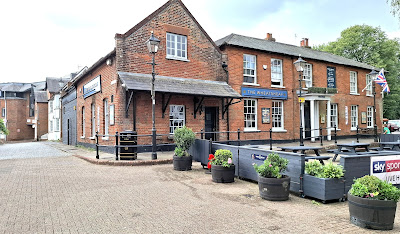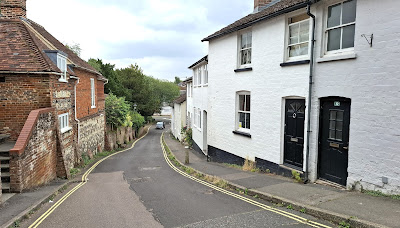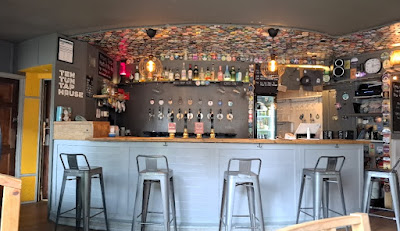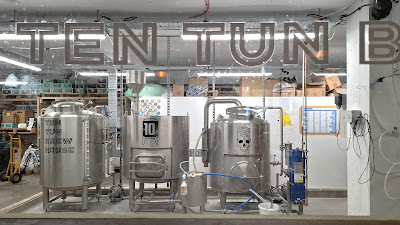Alton is the end of the line, as far as regular passenger services are concerned, but until 1973, the tracks ran all the way to Winchester. I don’t think this closure can be blamed on the infamous Doctor Beeching, as this was a little after his time, but with hindsight it does seem rather short-sighted to have closed another useful diversionary route. The line did not completely close because a preserved railway currently operates a 10 mile stretch of track, between Alton and New Alresford. This route is referred to as the Watercress Line, as it was once used to transport freshly harvested watercress from the beds in the Itchen Valley, to markets in London.
Alton is the birthplace of author, Jane Austen and also has a history as a brewing centre. Beer has long been part of its heritage - older drinkers may recall Courage Alton Bitter, Harp Lager also had a factory in the town, which was established by a consortium comprising Guinness, Courage, and several smaller breweries. The objective was to producing a home-grown lager brand, with Guinness's famous Irish Harp symbol used as its logo. Whether truncating the line at Alton is to blame for the slightly backwater feel to the town; that “end of the line” effect, but it wasn’t until we got back to Farnham that I noticed the quite striking difference between the two towns. For a start, Farnham has a population of just under 40,000 persons, whilst Alton can only boast around half of that figure. Nevertheless, the latter seemed a good starting point for our day out, even though we only visited three pubs in Alton, as opposed to five in Farnham. My train pulled into Alton at around 11:40, which allowed sufficient time to walk to the first pub on the itinerary, prior to it opening its doors. Waiting for me at the station, as if he knew I was coming, was none other than Martin Taylor, aka retired martin, ace pub-ticker and GBG completist, as well as one of the most accomplished of pub men that one could wish to know. I’d taken the precaution beforehand, of printing off a town map, but with Martin acting as my guide, the pair of us made our way through the centre of Alton, past the hotel he had booked into for the night, to the first pub of the day. This was the Ten Tun Tap House, a craft beer and cask ale pub with its own onsite brewery, situated just off the Market Square. Housed in a modern, brick-building, with a bare wood minimalist interior, TTTH is a pub with a bright and airy feel to it, along with something for everyone., This included a seat at the bar, a bench in the sun, big tables for large groups plus up to 15 different draught beers – 4 on hand-pump, plus 11 craft keg. Waiting for us at the pub, were the 10 or so other participants, including Citra Mick, plus Nick C. The rest of he group were local CAMRA members, most of whom were described to me as members of CAMRA Discourse. I confess to knowing absolutely nothing about “Discourse” apart from it being a kind of “talking shop” or echo chamber for CAMRA members to obsess and pontificate on various pub, beer and CAMRA branch related topics. I’m not going to say any more, as they all seemed a decent bunch, with a similar age to myself, and who am I to pass judgement? I was also their guest, in a manner of speaking. I chose a keg beer, called Sad Ken, produced in the brewery at the rear of the pub, primarily because I was in Untappd beer-ticking mode, and the two cask beers from Marble and Iron Pier, were ones I was already familiar with. It was a rather hazy American-style IPA, so I was pleased that I only ordered a half. I was also looking to pace myself over the course of what I knew would be a long day. Although I was introduced to the Discourse “mob”, I’m hopeless at remembering names, so apologies to anyone in the group whose name I might have missed – my memory has never been my strong-point! Before moving on to the next pub, I took a peep through the windows, into the brewery, as well as several photos. Everything looked shiny and new, and in complete contrast to the next pub, which was as traditional as they come. The Eight Bells is a Grade II listed building dates from the 1640s and has been a pub since at least the 1840s when it was known as the Sawyers Arms. This white-painted and unassuming pub, is situated about 10 minutes walk away from the centre of town, amongst a maze of attractive back streets, and virtually opposite the attractive St Lawrence's church.With a large main bar, plus a couple of smaller rooms leading off to the left of the serving area, the Eight Bells keeps old fashioned hours, with a closed period between 2 and 5pm. It was Local CAMRA Pub of the Year 2023 & 2024, a fact reflected by its interesting range of beers. With two brews from the Flower Pot Brewery at Cheriton, plus offerings from Bowman and Black Sheep, we were spoiled for choice, but I went for the Flower Pots Bitter, and old favourite, but one I hadn't seen for a long time.And so, to the final pub in the Alton section of the visit, which was the Railway Arms, just a short hop from the station. The Railway is a tied house belonging to Triple fff Brewery, a small, but longstanding company based in the village of Four Marks, close to the Watercress Line. The company was founded in 1997, and in 2008, their Alton's Pride was awarded Supreme Champion Beer of Britain. I of course had to try a glass, along with Moondance, another Triple fff Beer.
Most of the brewery's beers are either song or album titles, (Alton’s Pride aside), whilst the pub itself, looks like a couple of terraced Victorian cottages, knocked through into one. It is a very popular pub, with a strong local following, and is also the current CAMRA Pub of the Year. We departed shortly before 2pm, and caught the train back down the line to Farnham. It was only a 10 minute ride, but we'll leave the story here for the moment, and continue next time with the pubs of Farnham.















7 comments:
That Beeching chap certainly left his mark, didn't he !
I knew Farnham had a higher population than Alton, but you wouldn't think so walking from the station to the respective town centres.
I agree, Martin, that walk from the station, into Alton, certainly gave the impression of a similar sized town to Farnham.
As for Richard Beeching, this former chairman of ICI claimed he was just following the brief given to him, by the government of the time (Tory). The following government (Labour), campaigned on a platform (excuse the pun), of halting the cuts, but ended up implementing even more closures than Beeching originally intended - proving that you can't trust a politician whatever their persuasion.
Worse still, much of the data collected to support the various line closures was biased - figures for ticket sales, deliberately collected during quiet periods, to reinforce the case for culling. With no centralised, computer data available (no computers either), it was relatively easy to manipulate the figures, in favour of Beeching's axe.
What I think, was unforgivable, was the indecent haste in which the tracks were ripped up, following closure of the various lines, making it difficult, or in some cases impossible, to ever re-open them in the future.
Not just Beeching but Ernest Marples also played a big hand. The Ernest Marples that was Minister for Transport who not only installed Beeching to do the railway cuts, but also implemented a big undertaking in road building at the same time. Funnily enough, Ernest Marples also had business interests which included Marples Ridgway, a road building company! Make of that what you will...
Thanks Bobby, I was forgetting about Ernest Marples. Corruption and skullduggery were obviously as rife back in the 1960's, as they are today!
Norfolk is probably the county that has suffered most from having its rail lines culled. Barbara Castle (Red Barbara), was the villain of the piece, there.
Barbara Castle closed the railway line between Matlock and Buxton despite the development of tourism in Britain's first national park.
Yes, there was a bus between Derby and Manchester but that has recently been curtailed as I learnt travelling on it from Derby to just Buxton last Tuesday.
In the Anglers Rest at Millers Dale I saw a 1948 photograph of engines being changed there on a Manchester to London express, Central to Marylebone I think !
Paul, according to Wikipedia, Barbara Castle presided over the closure of approximately 2,050 miles of railways, as she enacted her part of the Beeching cuts. This was a betrayal of pre-election commitments by the Labour party to halt the proposals.
Having walked a section of the closed Midland line, between Millers Dale and Bakewell, and marveled at the engineering that went into structures such as the various tunnels, and the Monsal Head viaduct, one can only conclude this was nothing short than an act of vandalism.
British Rail ran a Pullman service on the line, back in the day. Bloody-minded, short-shortsightedness by politicians and the bean counters!
Yes Paul, the Blue Pullman as recorded on a 1960 British Transport Film, available free on BFI Player.
Post a Comment